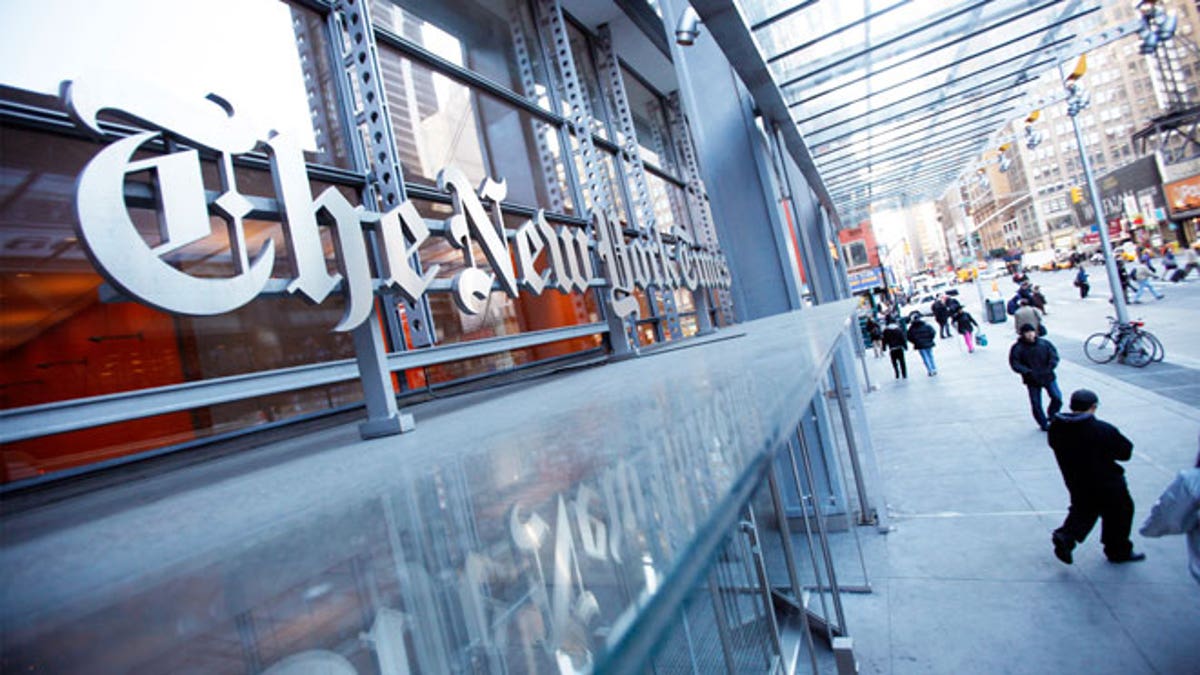
(Reuters)
The New York Times is clearly feeling the heat over an atrocious editorial they published on Tuesday blaming New York City cops for feelings of "self-pity" and "victimhood" after two of New York's finest were gunned down in cold blood as they sat in their patrol car.
I await an apology for an infantile editorial denigrating the lives and spirit of a police force that has saved thousands of lives
The editorial, published just three days after the funeral of one of those cops, was not only offensive to the sensibilities of New Yorkers who are grateful to our "men in blue," it was absolutely heartless in its timing. This was an editorial venal enough to rankle even liberal New Yorkers.
I await an apology for an infantile editorial denigrating the lives and spirit of a police force that has saved thousands of lives
Then on Wednesday, the New York Post reported that Mayor Bill de Blasio's office was in hyper-overdrive after the mayor was dissed by hundreds of cops at Officer Rafael Ramos's Saturday funeral. According to the Post (quoting the influential website DNAinfo), on Sunday and Monday, the mayor's office called friends and supporters of influence, trying to get them to publicly support the mayor and condemn the police union and associations. The Post quoted one of those who was tapped:
“City Hall wanted me to blast the Patrolmen’s Benevolent Association for turning their backs on him. They called up Monday, said they were calling all of us, and that it was our obligation to stand up defending the mayor.”
Sure enough, Tuesday the New York Times' editorial appeared and did just that.
While I obviously don't have access to phone records or emails between the mayor's office and the Times' editorial board, the mayor's push with allies on Sunday and Monday and the editorial's appearance on Tuesday seems more than coincidental.
I then went on Fox Business Network's "Varney & Co." on Wednesday to explain the timing of all this and my suspicions that the New York Times was influenced by the mayor's office in writing its editorial.
Frankly it strains credulity to believe that the mayor's office would miss its friends at the New York Times editorial board when it was putting the squeeze on friends and associates for help. And the editorial completely fit the narrative the mayor was looking for ... though in fairness to the mayor, in a far less artful manner than anything he has said.
What probably hurt the Times more than anything in what I said on "Varney" was my pointing out that the share price of the Times has come way down in 2014, at a time when most other stocks were booming.
Customers don't pay for journalism that just mimics the words and feelings of those in power. That's propaganda, not journalism. And when an editorial does that while bad mouthing heroic public servants who are getting killed for doing nothing other than risking their lives to protect the innocent, well, it doesn't do much for subscriptions.
So now the New York Times is attacking me. A Times representative sent a message to a compliant news network, claiming that my charges and speculations were "ludicrous." Rather than own up to the despicable notions of an editorial that refers to a "snarling sense of victimhood" among police officers, they go on the attack.
The one thing the Times apologist did not do was categorically deny that there was any contact between the mayor's office and anyone on the Times' board between the Saturday funeral and the Tuesday editorial. Such a denial would be hard to believe, but at least it would put them on record.
I await such a denial, as I await an apology for an infantile editorial denigrating the lives and spirit of a police force that has saved thousands of lives through its heroic actions over the years.
